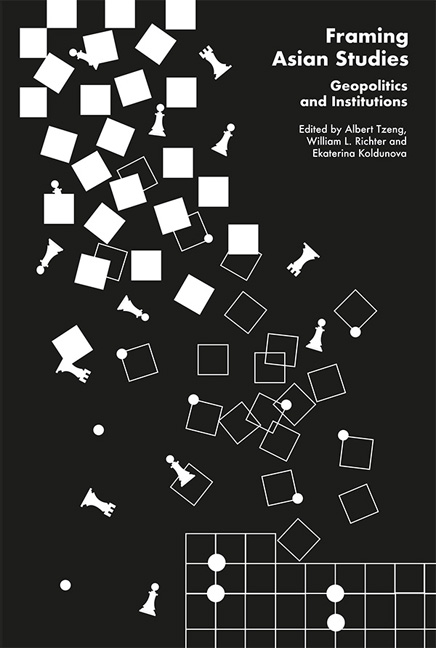Book contents
- Frontmatter
- Contents
- Foreword
- The Contributors
- 1 Introduction: Framing Asian Studies
- I Contested “Asia”
- II Geopolitical Framing of Western Discourse
- 5 From Geertz to Ricklefs: The Changing Discourse on Javanese Religion and its Wider Contexts
- 6 Framing Cambodian Affairs: French and American Scholarship, Media and Geopolitics
- 7 Studying Taiwan: The Politics of Area Studies in the United States and Europe
- III Asian Studies in Former Soviet States
- IV Inter-Asian Gazes
- Index
7 - Studying Taiwan: The Politics of Area Studies in the United States and Europe
from II - Geopolitical Framing of Western Discourse
Published online by Cambridge University Press: 28 June 2018
- Frontmatter
- Contents
- Foreword
- The Contributors
- 1 Introduction: Framing Asian Studies
- I Contested “Asia”
- II Geopolitical Framing of Western Discourse
- 5 From Geertz to Ricklefs: The Changing Discourse on Javanese Religion and its Wider Contexts
- 6 Framing Cambodian Affairs: French and American Scholarship, Media and Geopolitics
- 7 Studying Taiwan: The Politics of Area Studies in the United States and Europe
- III Asian Studies in Former Soviet States
- IV Inter-Asian Gazes
- Index
Summary
Taiwan Studies is a relatively new field of research which challenges the conventional model of area studies. Taiwan Studies started off as an emancipatory project in Taiwan itself and has since spread to the regional and global sphere. The notion of Taiwan that is constructed through academic discourse remains a contested subject and is influenced by power configurations.
Taiwan Studies as a new field of academic research has evolved at a time when area studies in general have experienced a serious crisis of legitimacy. They have been challenged due to their roots in the colonialist tradition, their frequent political complicity with U.S. policy during the Cold War and a growing awareness of the contingency of boundary drawing and calls for more universalist knowledge in the age of globalization (Palat 2000).
Contrary to this trend, Taiwan Studies has emerged as a new academic field in the United States and Europe very recently, since the late 1980s, and has expanded since then. It differs from traditional area studies, which were often set up by hegemonic powers seeking to gain knowledge and control over their colonial territories or partitioning the world into regions according to the geopolitical settings of the Cold War. It could be argued that the debate on area studies has had limited impact. The revival of area studies in the United States with regard to the Middle East, the Arab region and Central Asia demonstrates how acute security concerns make specialized regional expertise appear immediately relevant again. The contested claim of sovereignty over Taiwan creates a potential security risk in East Asia, which could spread to the United States as Taiwan's key ally. While the status quo is already built on weak foundations — essentially the fiction that the Chinese Civil War has never ended — recent developments in Taiwan have complicated the situation even more. A growing sense of Taiwan identity on the island has gradually undermined the one-China principle upon which the alleged stability of the status quo rests. It is therefore not surprising that Taiwan's domestic developments have received particular attention from outside it.
This, however, does not explain why Taiwan has been taken out of the larger context of China Studies and developed as a distinct field. Converging perspectives on Taiwan as a distinct region cannot easily be explained by hegemonic power interests.
- Type
- Chapter
- Information
- Framing Asian StudiesGeopolitics and Institutions, pp. 142 - 162Publisher: ISEAS–Yusof Ishak InstitutePrint publication year: 2018

